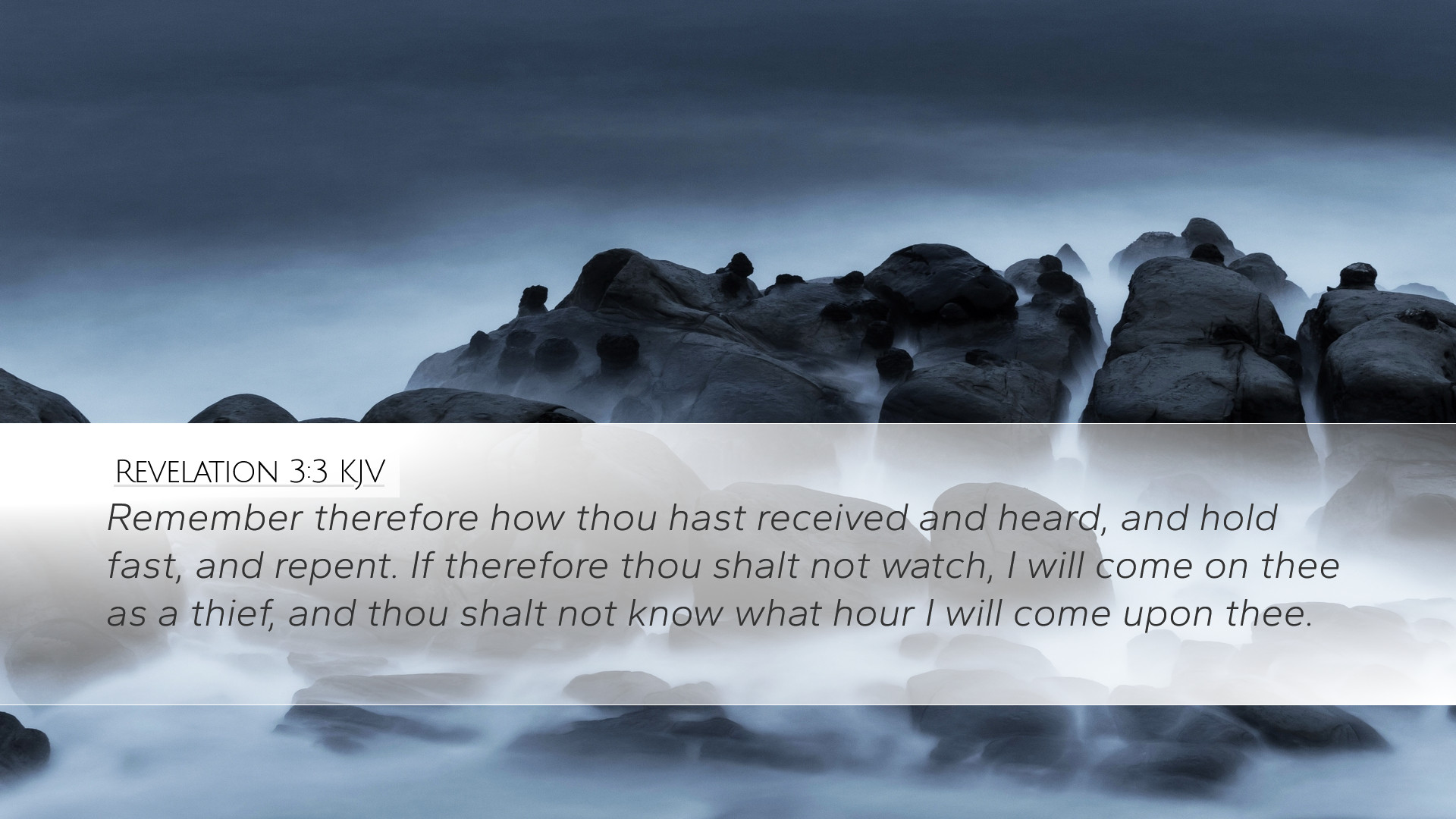Bible Commentary on Revelation 3:3
Revelation 3:3: "Remember therefore how thou hast received and heard, and hold fast, and repent. If therefore thou shalt not watch, I will come on thee as a thief, and thou shalt not know what hour I will come upon thee."
Introduction
This verse is a part of the address to the church in Sardis, one of the seven churches mentioned in the book of Revelation. In it, Christ admonishes the church regarding their spiritual slumber and the need for vigilant repentance. The insights derived from public domain commentaries illuminate the depth of the exhortation given to the congregation, highlighting terms such as ‘remember,’ ‘hold fast,’ and ‘repent.’
Exegesis of the Text
Revelation 3:3 contains several critical components that merit thorough exploration:
- Remember: This command emphasizes the importance of recollection. The church is urged to reflect on the gospel they received, its implications, and their initial fervor. Matthew Henry remarks that memory is crucial in the spiritual life to prevent lethargy.
- Hold Fast: This phrase signifies the necessity of steadfastness. Albert Barnes interprets this as a call to adhere rigorously to the teachings of Christ. It highlights the perils of compromise in response to cultural pressures and internal decay.
- Repent: Clarke points to repentance as an essential condition for restoration. Genuine repentance involves a heartfelt turn from sin and a return to right relationship with God, emphasizing grace and mercy.
- Watch: The call to vigilance indicates a proactive engagement with faith. To ‘watch’ implies not only anticipation of Christ's return but also the diligence in personal holiness and corporate faithful worship.
The Historical Context of Sardis
Understanding the church of Sardis requires insight into its historical and cultural background. Sardis was a flourishing city known for its wealth and prestige. However, its spiritual life was characterized by complacency and an external semblance of vitality that belied its true spiritual condition. The contrasts between outward appearances and actual spiritual health form the core of the message here.
The Consequences of Spiritual Decline
Matthew Henry notes that the church's lack of vigilance will lead to dire consequences. The imagery of Christ coming as a thief underscores the suddenness of His return and serves as a strong warning against spiritual apathy. The unpreparedness of the church is starkly contrasted with the call to vigilance, suggesting that neglect in spiritual matters can lead to severe judgment.
Pastoral Applications
For pastors today, this passage serves as a vital reminder regarding the health of their congregations. A few key applications can be deduced:
- Encouraging Remembrance: Pastors should regularly help their congregations remember the foundations of their faith through teaching and remembrance ceremonies.
- Maintaining Faithfulness: Churches must emphasize doctrinal fidelity and the importance of spiritual disciplines that reinforce this commitment.
- Promoting Vigilance: Fostering a culture of anticipation for Christ's return encourages believers to live holy lives, actively engaging in their spiritual growth.
Theological Reflections
This passage also leads to greater theological reflection on the themes of grace, judgment, and redemption. The call to vigilance wrapped in grace reminds us that while judgment is certain, God continuously offers opportunities for restoration through repentance. This duality invites serious contemplation of God’s nature as both just and merciful.
Conclusion
In conclusion, Revelation 3:3 serves as a profound exhortation to the church, urging remembrance, vigilance, and repentance. The insights drawn from Matthew Henry, Albert Barnes, and Adam Clarke collectively enhance our understanding of the passage, providing a robust foundation for preaching and teaching in today’s context. By heeding the warnings and promises within this verse, Christians can strive for a vibrant faith that reflects the heart of God.


